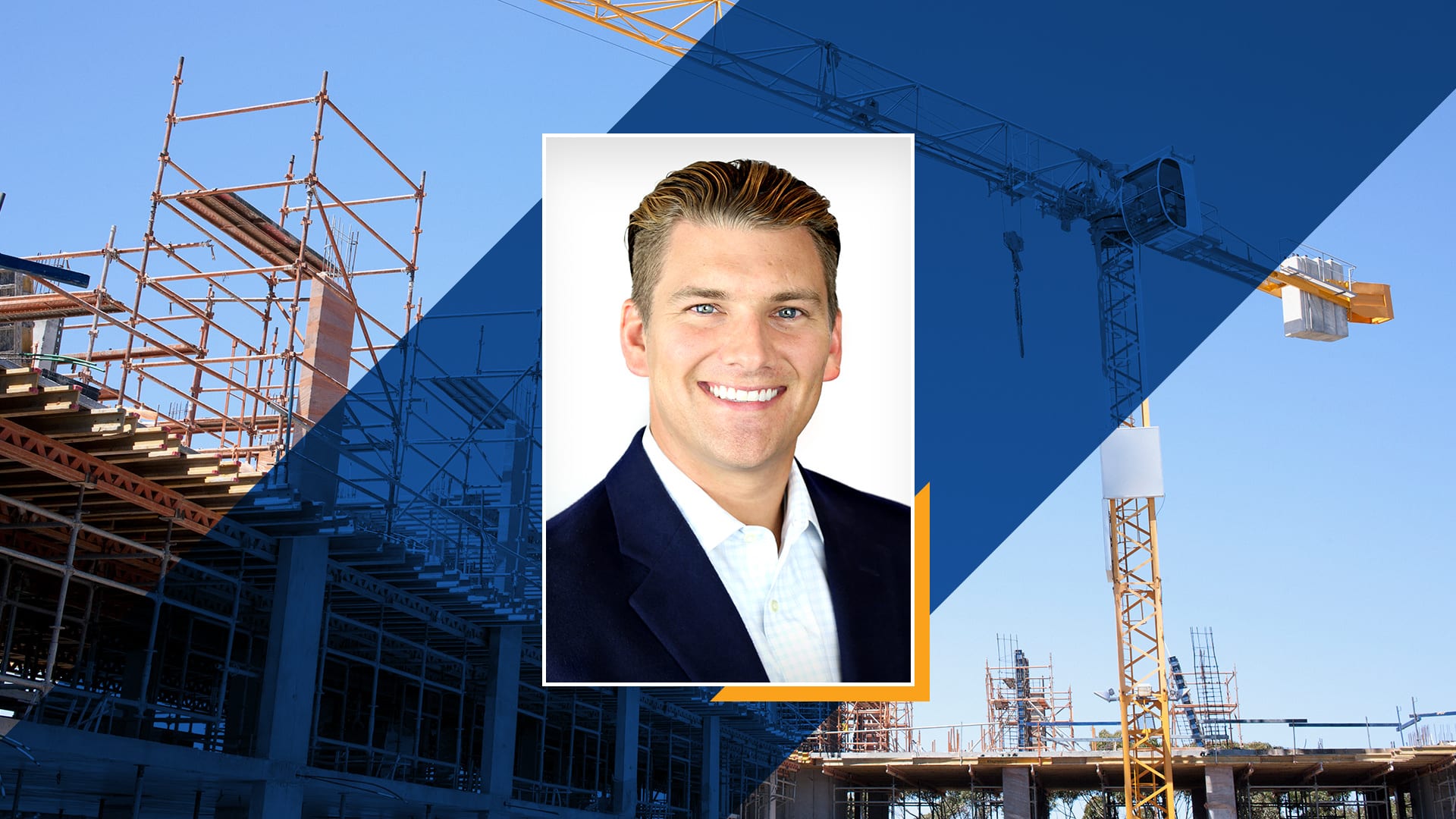Help us improve your experience. See content that is made for you!
See how IBM increased their efficiency by up to 30%!

Help us improve your experience. See content that is made for you!
See how IBM increased their efficiency by up to 30%!


Construction has always been a fast-paced industry. However, 2020 has added another layer of complexity; companies must find a balance between increasing efficiency on tight timelines and providing employees with safe and hygienic working environments. Achieving that balance requires a great deal of coordination behind the scenes. Construction professionals are making it happen through innovative planning, careful analysis, and creative approaches to problems. We’re highlighting these professionals and the work they’ve accomplished in our 2020 Heroes series.
On the recent 40 Under 40: Champions of Construction 2020, you’ll find Geoffrey Bean, Virtual Construction Coordinator at W.M. Jordan Company in Newport News, Virginia. Geoff has hit the ground running since the pandemic began, going above and beyond to ensure safety for his team. Geoff and his team support W.M. Jordan Company by helping to support safety, productivity, efficiency, and cleanliness on-site. We recently caught up with Geoff to learn a bit more about why he believes a balance of methodicalness and flexibility is critical to construction today. Read his story below.
W.M. Jordan Company specializes in commercial construction. We do government, healthcare, hospitality, industrial, K-12, higher education, planned communities, religious, senior living, and various other specialty projects. Basically, you name it, and we'll build it.
As for me, my main focus has been in the virtual world doing BIM and other associated tasks over the last five or six years. In that role, I got to touch a little bit of everything within the business, which has been a great opportunity in that sense. Right now, as I transition out of virtual construction and into project management, I am wearing many different hats out on my current site. Until the project comes to a close, I am operating as somewhat of a Jack-of-all-trades utility player for the team, working in whatever capacity required to get the job done.
Throughout my career prior to, but especially within virtual construction, many of my peers were able to see the benefits and value I was able to provide to many aspects of the business. Over the years, I was given the opportunity to work on numerous projects in many different market sectors, as well as work with many different owners and project teams throughout the company. Because of that, I ended up with a broad array of expertise in different projects and building types.
To start, we had numerous team discussions to come up with a “build safe plan”, with priority number one being to keep everyone safe on-site. We needed to consider how to maintain social distancing with construction tasks that couldn’t be performed six feet apart. We needed to address that fact and develop protocols to follow in those situations.
Then, we took it a step further. We reviewed the site logistically in a methodical fashion. We analyzed what would happen if we split the active deck in half to keep crews separated. In doing so, we modified our elevated slab build logic, adjusted specific task approaches, and modified the means and methods for worker and material movement on site. This approach actually helped us improve because we became more methodical with our processes.
One of the most difficult challenges with 2020 was the way the lines of work, family, school, and community were all somewhat blurred together. The days seemed to grow longer and mesh together; throughout the industry, especially at the height of the pandemic, it was understood that you might see emails coming through at 10 p.m., midnight, 2 a.m., etc. It was not that people weren’t working during the day if you couldn’t reach them. That became understood. It was that they may have had to handle something at home and had to get back to it in their own time. Everyone became “always on” in their own time. The beauty of our industry is that the individuals had the adaptability and the resolve to keep things moving despite the challenges at hand. I consider myself very lucky to be in a position where everyone around me stepped up to the plate and pivoted to ensure they were lifting up team members, design partners, owners, etc., no matter the circumstance.
During a year when many people could have packed their bags and remained stagnant, we decided to move forward. Our industry refused to stop.
For our families, for our companies, and for the sake of the industry itself, was stopping ever even really an option? I once heard Peyton Manning discuss the best way to beat a blitz, and his analysis has stuck with me since (or at least my interpretation of it). When pressure is coming from one direction, human nature naturally takes one in the opposite direction. It’s the flight mechanism in “fight or flight”. What I found most intriguing about his analysis is that the greatest opportunity generally lies directly on the other side of the pressure. In football, and in overly simple terms, this means hitting the wide-open man in the gap left behind by your pursuers. In construction and in life, this means taking a risk by standing tall in the face of adversity, stepping out of your comfort zone, going against the grain, and coming out better than you ever were before on the other side. In 2020, my teams and I did just that. When the blitz was on, we decided to plant our feet and dive in to find better ways to navigate not only these, but also future, difficulties associated with such scenarios.
We always have to be “on the ready” for the next thing. We must keep that in mind—the word “flexible.” At this point in time, we realize that tomorrow could bring a new challenge, opportunity, regulation, executive order, or mandate; for that reason, we have processes in place that incorporate flexibility into our plans as a constant. “Constant flex” is a delicate constraint to work with, but it is how we have to function as a business, as a team, as individuals, and as a community to progress into the future of today’s world.
A huge part of continual creativity and dedication on site is understanding that everyone has a voice and input worth hearing; it's not just the construction manager reigning down orders. When it comes to ideas, there is no such thing as a bad one. It’s about letting suggestions be heard. It’s about letting every single person on every single one of our job sites know that they matter and that we care. This is something that I believe our team has accomplished and it’s not something that you get everywhere. When you genuinely care about the people you work for, the people you work with, and the people who work for you, a contagious environment of empathy, caring, and compassion can spread like wildfire.
Aside from my wife, obviously (haha), I don’t think I could pinpoint a single standout individual as my personal hero of 2020. That said, my collection of personal heroes is too long to list. In my opinion, the title of HERO belongs in the hands of ALL of those on the front lines. It is easy to hear this and immediately think of the doctors, firefighters, military personnel, nurses, and police officers, but I will not limit the “front lines” to that description in this particular instance. The individuals I am also going to include in this description include those not in the aforementioned professions that could not work from home that continued to persevere. I am talking about the delivery drivers, the grocery and convenience store clerks, the construction workers, etc. that kept this country going while many sheltered in place. Being partial, I will say that I was enamored by the fact that while most of the country was at home, because of the men and women of our industry, construction continued to go horizontal and vertical. This progress could not have been made without the workers in the field that didn’t have the option to “WFH.” The people that never stopped were a real inspiration to me. Speaking of inspiration, and back to my first point, my wife was nothing short of a superhero to me in 2020. She did more for me and our family than I ever could have imagined. Despite the fact that we took over her home office, she just kept on going. During all the times where I've had to do extra work for work, school, or other external organizations, she just let me go and made everything happen and still kept up with everything she was doing. She was and continues to be an unbelievable friend, mom, and wife. I don’t know how I’d do it all without her love and support.
One of the things they need to do is continue to work with their legislators to ensure that construction stays essential and that it's known that this particular industry cannot be shut down. The industry needs to continue to come up with creative ways to maintain schedules when manpower is short. We’re already facing workforce shortages. It’s important to be creative and work inside the confines of that, especially in light of a pandemic where people aren't necessarily excited to get out in the field. Companies need to continue to find new and innovative ways to reduce risk on projects by shifting construction from the field to more controlled environments. Also, individuals and firms need to plan for the upcoming talent at their companies and the next generation entering the workforce; the new beliefs, ideas, and methods can and should be harnessed to accelerate potential energy.

May we collect and use your data?
Learn more about the Third Party Services we use and our Privacy Statement.May we collect and use your data to tailor your experience?
Explore the benefits of a customized experience by managing your privacy settings for this site or visit our Privacy Statement to learn more about your options.